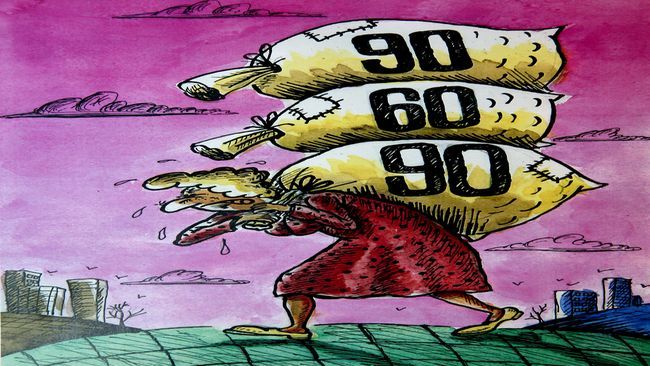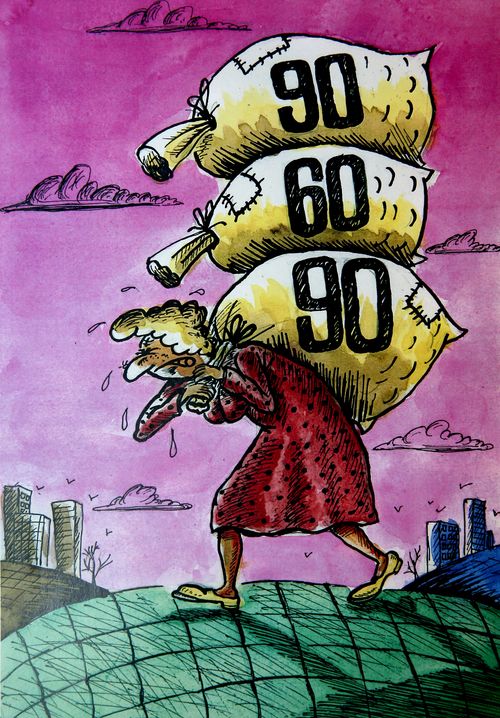Freedom, equality, sisterhood
A comparative interview with feminists from Ukraine and Russia about the situation of women
It is no secret that according to many aspects that refer to women’s equal rights with men (decent salaries, “glass ceiling” in career growth, protection from violence, etc.) we are far from European standards; meanwhile this is one of the key problems in the EU. To explain the scale of the problem and possible ways to solve it, I have spoken to two activists of the feminist movement, Anna Sharyhina from Kharkiv and Bella Rapoport from St. Petersburg.
“FEMINISM HAS MULTIFORM, LIKE ANY OTHER MOVEMENT”
How did you arrive at your present-day beliefs?
Anna SHARYHINA: “In 2007 I joined the activist movement and understood that I lacked argumentation during the discussion of problematic topics with the opponents, both female and male ones. I started to attend purposefully the lectures on gender research and theory of feminism, started to write texts on how gender, sexuality, and power are mutually connected in present-day society. I have been continuing my research, but I lack time – I spend a lot of energy for activism.”
Bella RAPOPORT: “I was leading an ordinary life, I wanted to get married, but when I became a journalist, I understood that I didn’t want that so much. About six years ago there was a well-known incident: girl got intoxicated, brought out from a club, and suffered sexual harassment, but the worst was that everyone in unison was defaming the girl. I’d been a frequent visitor of night clubs, I’ve been a guest to some people’s places, nothing has ever happened to me, but I tried this story on me. And my feminism started when I stopped to yield to pressure connected with marriage and birth of children, later I started to notice other things too.”
How did it change your life?
A.Sh.: “The change is considerable, and my life continues to change, because in my everyday life I prefer to communicate with people who are close to me in spirit. Most of my friends and relatives, even if they don’t share my views, at least understand my arguments.”
B.R.: “I have lost contact practically with all of my acquaintances from my life before the feminist movement. I got new female and male friends. I used to be a heterosexual, now I have a girlfriend. A lot of things have changed.”
Is there a cornerstone idea which would unite all movements within feminism?
A.Sh.: “Feminism is changing rapidly, you cannot say that there are common things. For example, the feminism of suffragists’ time doesn’t have almost anything in common with the feminism of today. Another example: in Ukraine there is an initiative ‘Invisible Battalion.’ They study the role of women in ATO. Recently a representative of a European women’s organization asked me, ‘Why are they trying to insert people in the sphere of the armed conflict, which is an absolutely patriarchal way of solving problems?’ Feminism has a space for critical reconsideration of gender roles, and this may be a very large range.”
B.R.: “Feminism is multiform, like any other movement. There is feminism that fights for the rights of women exclusively, but doesn’t include the problems of homophobia and racism on the agenda. I am concerned about my own discrimination, but I cannot speak about it without including other kinds of inequality. I see patriarchate as a hierarchal system, which causes discrimination, and it was born much earlier than even capitalism. The ruination of hierarchal system and gender biases, post-gender society are ideals that are impossible to achieve. Now we have the fight against violence and other ways of oppressing women.”
“EVERYTHING THAT IS GOING ON WITH ME IS POLITICS”
Is feminism a political or social stand?
A.Sh.: “The second wave of feminism has a wonderful motto: ‘Personal is political.’ Is family considered to be a private sphere? It seems to be. On the other hand, it is strictly regulated by government. We have an institute of marriage, but partnerships for LGBT people and surrogate motherhood are not allowed; if a woman is not married she cannot apply to the sperm bank. Is it a personal or political thing to have children? I mean feminism is not a political party, but it is still politics in terms of the questions to the power.”
B.R.: “Everything that is going on with me is politics: the fact that advertisement makes a merchandise of me as a woman, the fact that I don’t feel secure in the streets, am afraid of harassment, raping, because the state doesn’t protect me – not only by laws, but by educating men – all this in total is politics.”
What needs to be done for an ordinary woman to know about her rights?
A.Sh.: “I believe in self-education initiatives. One method is not enough to solve the problem: it’s about solidarity, talking the problems through, and school-university enlightenment, and direct actions – everything needs to be done at once.”
B.R.: “It would be good if the state would take up the problem of gender equality: educate children, tell them about equality, adequate attitude to other person’s body, tell girls what they can be. When I was in the kindergarten I was told that if I would wash floors badly, the husband would leave me, but no one told me that I could become an astronaut – so, I haven’t become one. Society must put efforts into gender equality, then women will have more chances to achieve it.”
“THE ROLE OF MEN IN FEMINISM IS IN THE ABILITY TO KEEP SILENCE WHEN IT’S NEEDED AND STEP ASIDE”
What is the place of men in feminism?
A.Sh.: “This is a provocation.”
Why?
A.Sh.: “The first answer that crosses my mind is ‘in the last row.’ Of course, this is a metaphor. I hold many trainings, seminars, and discussions, and I notice that even if the audience consists of 90 percent of women, the remaining 10 percent represented by men speak much more than all women together. And it would be fine is they said something important. But they speak in a confident and strict manner, as if they are speaking the last-instance truth. Maybe the role of men in feminism is in realizing of their own privileges as a class and, consequently, in the ability to keep silent when it’s needed and step aside, giving place, space, and power. This is very important when the horizontal interaction is formed – without one-party leadership, so that the possibilities were equal indeed. And also help. Helping women to develop, educate them, if there is such need, support in realization of some skill. This is a complicated task and great self-cultivation, which is probably why there are not so many men among feminists, but they are present.”
B.R.: “Unfortunately, neither women’s nor men’s socialization allow us to communicate as equals. When men talk about gender equality, they talk a lot, whereas women practically don’t say anything. It is enough for a man to say that he is a feminist, and the whole world will be at his feet, and you can work hard for 10 years, and yet you will be called names and ignored: it’s very sad when even in feminism you face a ‘glass ceiling.’ This is a common situation, which is why I think that men can only be companions, be near and support, but no leading roles.”
“ALL POLITICIANS ARE PUTIN IN OUR COUNTRY”
How would you characterize the situation of women in Ukraine?
A.Sh.: “I would say it is bad and hushed. We are offered to follow traditional roles: invent some kind of ‘nature,’ according to which woman was born with an instinct of serving or child-bearing labor, and is not fully a person. The worst thing is that the questions of the situation of women in political, management, and social levels are postponed as secondary ones. And I think this attitude to woman as something secondary is the greatest evil today. A year ago when on Facebook I raised the question of violence against women, one Kharkiv activist said, ‘What human rights? The country is war-stricken.’ This is our eternal building of hierarchies. Something must always be a priority, then comes the rest, at the same time the priority issue is not being solved anyway. In the time of the economic crisis the question of women’s rights was untimely, the presidents have been changing – it was not timely either, the first and second revolutions, the war – a reason has always been found to postpone important issues. Are all state officials involved in the issues connected with the war? If they were, the war would have been over now.”

“THE BURDEN OF CANONS” BY VADYM SYMYNOHA FROM KHERSON WON SECOND PLACE AT THE 7th ALL-UKRAINIAN COMPETITION OF HUMAN RIGHTS CARTOONS / Photo replica by Ruslan KANIUKA, The Day
How would you characterize the situation of women in Russia?
B.R.: “Russia is large. There is St. Petersburg, and there is Dagestan. It is bad in Petersburg, but compared to Dagestan it is quite tolerable. Wasn’t circumcised [the interviewee means the surgery of female circumcision which is practiced in North Caucasus. – Author], I can wear shorts in the street – thanks for that. On the other hand, if someone attacks me and I will defend myself, I will be sent to jail, because women who defend against their rapists or husbands beating them, are in jail, for the most part. If I face such a threat, there won’t be a way out.”
Can the situation be improved within the framework of existing social formation?
A.Sh.: “You should do everything at once. Along with the actions, people must be enlightened, and an influence on the government must be realized. Write petitions, offer your versions of textbooks, work with female and male teachers, female and male students. There is a plenty of work awaiting us.”
B.R.: “I am not optimistic. Our laws guaranty equality on paper, but in fact that are not working. On the other hand, they approve laws on decriminalization of the threat of homicide, non-severe bodily blows, avoiding alimony. I can come to police, write an application, but they give me a brush-off and sneer. No, it is impossible in present-day Russia.”
Let’s imagine that Putin leaves, democracy comes. Will the situation change?
B.R.: “I don’t believe in this. Does the liberal opposition treat women better? All politicians are Putin in our country. Liberals are Putin, leftists are Putin too. They are all like Putin. They communicate in a similar way, they cover one another’s backs, their attitude to everything is the same. They just want power.”
EPILOGUE. FUTURE
Will we live till the time when there will be no need for feminism anymore?
A.Sh.: “No.”
B.R.: “I don’t think it’s possible.”
Is feminism able to save humanity?
A.Sh.: “From what?”
From itself of course.
A.Sh.: “I think that humanity can be saved by proper reflection and non-stop development. But what we have named feminism, conserved and lead empty talks about, it won’t help.”
B.R.: “I think this is the only thing that can save humanity.”
Newspaper output №:
№21, (2016)Section
Society





